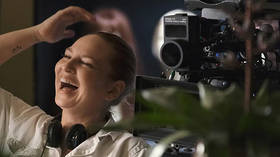As the father of an autistic child, I’m appalled by Sia’s movie Music. It shows she knows nothing about this remarkable condition

The movie Music has rightly been condemned for featuring potentially lethal restraint holds to control an autistic girl. It’s an embarrassing, infantile take on a complex genetic disorder that director Sia should be ashamed of.
So far off target, so tin-eared is the directorial debut of pop singer Sia that her new movie Music does for understanding autism what the fake treatments peddled online that encourage parents to dose their autistic kids with industrial-strength bleach do to ‘cure’ them.
Inexplicably, this tone-deaf disaster has earned two Golden Globe nominations while at the same time featuring restraint techniques that can seriously injure, as the tale of two sisters unfolds between music videos. In a salve to the outcry about this fundamental blunder, the novice director has announced a warning label will be attached to the movie.
And that is just the beginning of what’s wrong here.
For a start, autism is not a disease and there is no cure. Not bleach, not vitamins, blood cell injections or hyperbaric oxygen therapy. It is, however, a complex condition that affects an estimated 700,000 people in the UK and around one child in every 100. My daughter is among that number.
And sure, once upon a time, her behaviour was a constant puzzle. Most children love a routine but for Elvi, any deviation from the usual order of things, or unexpectedly imposing changes to what she was used to, would result in an uncontrollable meltdown. Anywhere. Anytime. Often in public.
But never, ever, did her mum or I resort to the sort of restraint tactics displayed in Sia’s boneheaded movie that have raised such alarm. In my experience, attempting to restrain my daughter, maybe thinking she would somehow hurt herself if I didn’t, simply made the situation far worse and harder to de-escalate.
However, among the mountain of information out there, I began reading the work of psychologist Simon Baron-Cohen – the smarter cousin of Borat, Sacha Baron Cohen, and the head of Cambridge University’s Autism Research Centre. His most recent work, The Pattern Seekers, is a compelling view of autism and its place in the neurotypical world which most of us inhabit.
He argues for the power of ‘if, and, then’ as a ‘systemising mechanism’ that drives human innovation. Among the many examples he uses to support his argument, agriculture is a clear one. If a seed is planted in soil and rain falls on that soil, then the seed will sprout.
Also on rt.com It’s GENETIC after all: Largest-ever study finds 102 genes responsible for autismPattern seekers among our ancestors would ask what would happen if 100 seeds were planted, and watered? Would there then be 100 sprouting plants with fruit? Enough to feed the entire village? If flint was sharpened and tied to a stick, then would you have a useful weapon?
Using functional magnetic resonance imaging, Baron-Cohen has even identified that part of the brain that works on exploring these ‘if, and, then’ patterns, showing how the focus required in seeking patterns can actually be observed. Clever stuff.
Going even further, he has looked at how people empathise and systemise and where we all fall if scored, for instance, along that line, with total empathisers at one end and extreme systemisers at the other. What his research has identified is a small subset of around three percent of men and one percent of women who fall into the ‘extreme systemisers’ category. Obsessive ‘if-and-then’ thinkers, but lacking empathy and seemingly incapable of reading the mood of another person.
To anyone who has spent any length of time with an autistic person, this is painfully familiar.
And even outside the realm of autism, we all know people who are incredibly attentive to detail, to the point of obsession, but struggle in personal relationships or achieving employment because they’re considered slightly weird.
Also on rt.com Fecal transplants yield MASSIVE breakthrough for child autism, 50% reduction in severity (VIDEO)One of Baron-Cohen’s many lightbulb moments in his research is the conclusion that the common perception of autism is leading to an incredible waste of talent. He writes of an autistic man he has worked with who struggles to make ordinary conversation, but can diagnose car trouble just from the sounds of an engine. Now in his 40s he remains unemployed, despite applying for hundreds of jobs.
The psychologist writes, “When the hyper-systemizing qualities of autism are supported and nurtured, the unique skills and talents of autistic individuals can shine — to their benefit and to the benefit of society.”
This is exactly what organisations like the UK-based Genius Within and Autistica aim to do.
Sure, not everyone with autism will find work as a C# coder or data analyst. I dream of my daughter finding future employment, maybe sorting items for packaging or recycling. Elvi is careful, considerate and discriminating in her pattern-seeking, despite her additional challenges, and would enjoy this sort of work.
She’s a big fan of blind, autistic savant Derek Paravicini who has often entertained her for hours, flawlessly playing piano for her from request – anything she liked, from Twinkle, Twinkle Little Star to Eine kleine Nachtmusik, earning him the nickname The Human iPod. To Derek, the musical patterns are perfectly clear; he doesn’t need to see the piano keys or read the sheet music. He now earns a living touring and performing, often playing two pianos at the same time.
Also on rt.com Transgender & ‘gender diverse’ people six times more likely to be diagnosed as autistic, true figure likely higher – studyHe is on a different planet to Australian-born Sia and her directorial pretensions. When called out about her new movie and its saccharine storyline of hard-bitten grifter finding how to love through her sister’s autism, she responded in a self-pitying tirade, “I have my own unique view of the community, and felt it is underrepresented and compelled to make it. If that makes me a shit I’m a shit, but my intentions are awesome.” Another tweet declared she felt ‘FURY’ at being challenged. She’s since deleted her Twitter account altogether in a huff.
She could at least be honest. This isn’t an attempt to explore autism or celebrate care givers. It’s a vehicle to market ‘10 new Sia songs’ as it trumpets on the trailer, and to showcase her muse, 18-year-old dancer Maddie Ziegler, who has appeared in a string of Sia’s music videos and clearly wants a shift to the big screen.
Sia’s understanding of autism seems to have been gleaned from half-watching Rain Man while googling ‘restraint holds’ so let’s not pretend Music will change the way anyone looks at this remarkable condition.
Because that needs patience and understanding of what makes us human and how we relate to one another. Stick to the funny wigs and the catchy tunes, Sia. If this nonsense is any indication of your social sensibilities, then your future is certainly not in movies.
Like this story? Share it with a friend!
The statements, views and opinions expressed in this column are solely those of the author and do not necessarily represent those of RT.















